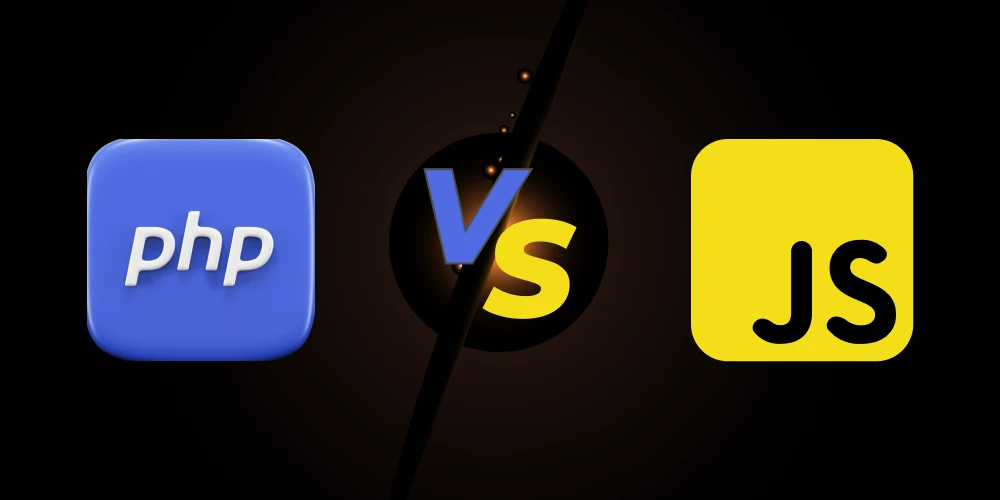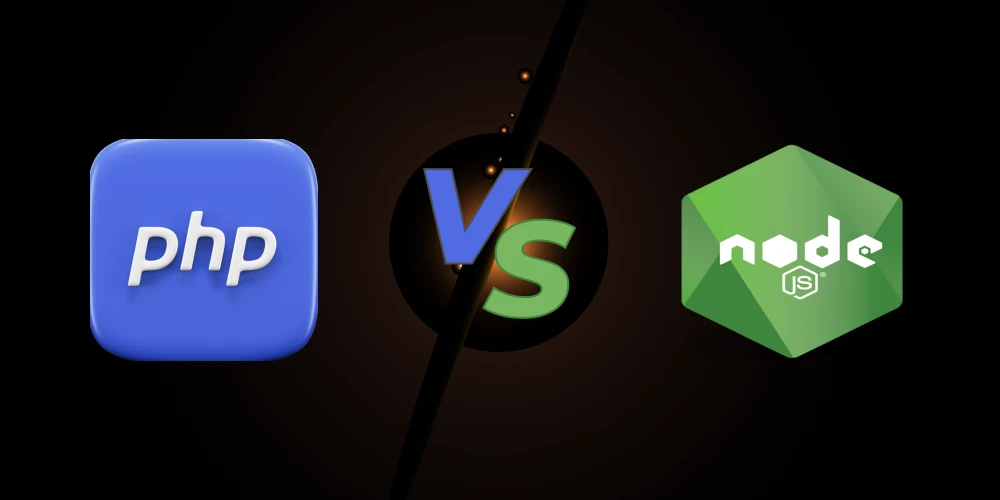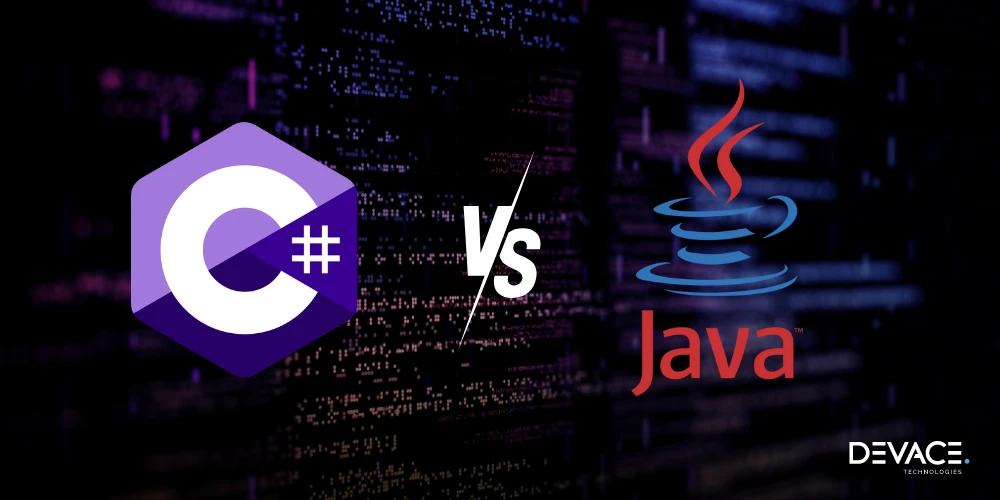With the availability of several programming languages and regular tech updates, the selection of the right scripting language is quite confusing. PHP and JavaScript are among the widely used languages among web developers. Both have dynamic features; however, the question is which one to opt for your web projects? To address this query, you must know all key points of the PHP vs JavaScript debate.
In this blog, we are going to get deeper insights into JavaScript vs PHP; after reading this you will be able to choose the best language to design scalable web applications.
Overview of PHP
Hypertext Preprocessor (PHP) is a server-side programming language, designed primarily for web development. The basic purpose behind its creation was to simplify the development of complex websites. Moreover, its open-source design makes it available for all web developers to utilize for web development, modifications, and distribution.
It is useful in creating web applications, eCommerce websites, and content management systems as well. Additionally, PHP is a backend scripting language, making it suitable to run on a server, for data processing, and for creating content to send to clients’ web browsers.
Key Features of PHP
Here we have some key features of PHP including server-side programming, database integration, open-source nature, cross-platform compatibility, and dynamic frameworks.
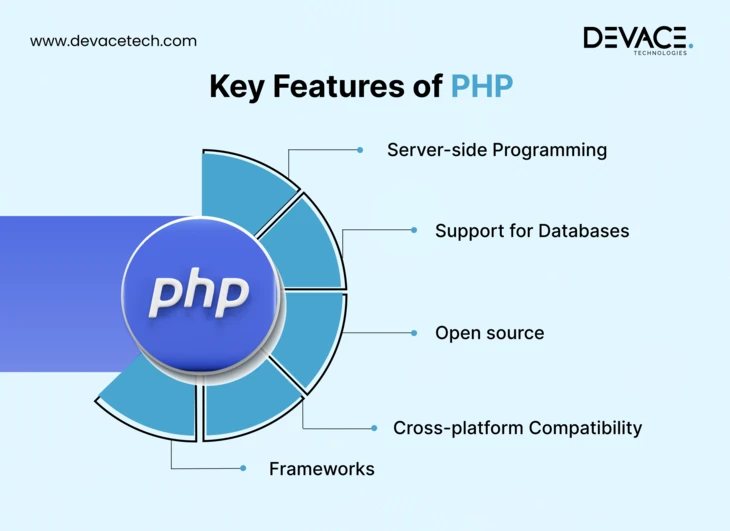
1. Server-side Programming
In PHP, before sending content to the client code is processed on the server. This feature enables PHP to perform complicated tasks such as handling user input, processing data sent through forms, tracking user activities through session management, handling files, and generating engaging content.
2. Support for Databases
The ability of PHP to integrate multiple databases makes it an ideal choice for sites that require data retrieval and storage. Moreover, its built-in features enable it to integrate multiple databases including MySQL, SQLite, and PostgreSQL.
3. Open source
The source code of PHP is publicly available, making it an open-source language that is free to use. Also, it can be modified as per individual or organization’s requirements. This open access makes it a popular language for programmers, enhancing its active community.
4. Cross-Platform Compatibility
Another important feature of PHP is its compatibility with multiple platforms, enabling it to run effectively on different operating systems like Windows, Linux, and macOS. Additionally, developers and teams who use PHP can work in diverse environments as per their web project preferences.
5. Frameworks
Scalable PHP frameworks help streamline web application development. Frameworks such as Laravel, CodeIgniter, or Zend framework offer libraries, tools, and built-in modules to design scalable web apps.
If you face any difficulty in working with PHP frameworks, you can hire PHP developers to streamline your web tasks.
Applications of PHP
Some common areas in which PHP can be used include web application development, CMS creation, and eCommerce sites.
1. CMS creation
Content Management systems like WordPress, Joomla, and Drupal are all powered by PHP. These platforms allow users to design, manage, and change content on websites, avoiding the complexities of coding.
2. Web Applications
Various applications range from social media sites to business tools, and knowledge base platforms like Wikipedia, Facebook, Pinterest, or Slack are generated through PHP. While designing these sites, PHP manages critical backend operations, handles user authentication, interacts with databases, and gives real-time data to users.
3. E-sites
Another popular application of PHP is its utilization in developing eCommerce sites. These sites are difficult to design due to user management, product catalogs, and payment integrations. It is easier to develop such eCommerce websites with PHP, handling all web operations.
PHP Frameworks
Some of the most popular PHP frameworks include Laravel, Symfony, and CodeIgniter.
- Laravel: An advanced PHP framework, famous for its elegance especially for designing RESTful APIs.
- Symfony: It is a full-stacked PHP-based framework to create enterprise-level complex web applications.
- CodeIgniter: Another PHP framework that is best for small web applications because of its lightweight architecture.
Overview of JavaScript
JavaScript is a high-scale and versatile programming language. It is fundamentally used for developing front-end features for web applications. Originally created as a client-end scripting language, it has transformed into a powerful tool for back-end and front-end web development.
Moreover, Node.js makes it a popular choice for backend development as well, which means JavaScript is a full-stack scripting language.
Key Features of JavaScript
Here we have some key features of JavaScript such as client-side programming, asynchronous processing, and event-driven scripting.
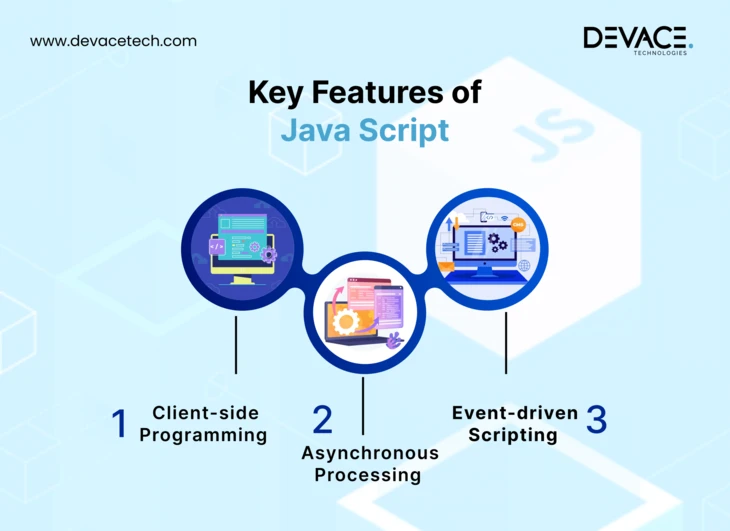
1. Client-side Programming
Companies can leverage JavaScript to improve their site’s front-end user interaction, offering tasks like form validation, content updates, and animations.
2. Asynchronous Processing
Features like Promises and AJAX enable JavaScript to make asynchronous calls to servers, making changes to any part of a site without any requirement of full-page refresh.
3. Event-driven Scripting
Another key feature is JavaScript’s event-driven scripting ability, as it is responsive toward user interactions such as scrolls, clicks, and keypresses, crucial to designing engaging web pages.
Hire full-stack developers to upscale your web development journey
Applications of JavaScript
The versatile nature of JavaScript makes it useful in multiple domains of software development. It is mostly involved in front-end development, back-end development, and designing mobile applications.
1. Frontend Development
Mostly JavaScript is used in building interactive user interfaces in different web browsers. Moreover, updates in online content can be made without reloading the page. It is also helpful in making asynchronous requests to servers through Asynchronous JavaScript and XML (AJAX).
2. Backend Development
Primarily JavaScript was used for front-end development. However, due to the addition of Node.js, it is now widely used for backend software development as well. Additionally, applications requiring real-time data exchange can be smoothly created with Node.js.
3. Mobile Apps
The frameworks that combine native device features and web technologies assist in creating mobile applications. Such frameworks include React Native, Ionic, and Native Script, allowing developers to build scalable mobile apps for both Android and iOS.
JavaScript Frameworks
Let’s discuss some popular JavaScript frameworks including Angular, React, and Vue.js.
1. Angular
This framework, developed by Google, is a full-stack front-end JavaScript-based framework to design web applications. The two-way data binding feature of Angular synchronizes the data between the view and the model. Moreover, its dependency injection system enables easy testing of components. Angular developers can assist you in this component-based testing.
2. React
It is a component-based library of JavaScript. It focuses on the view layer of web apps and enables programmers to build interactive user interfaces. Additionally, its virtual DOM helps in the optimization of rendering performance.
3. Vue.js
This one is a progressive framework. Vue.js is commonly used to upscale already existing web applications. It can range from introducing interactivity to a portion of UI to full-scale SPAs. Also, its reactive data binding system updates the DOM automatically. If you have any difficulty working with Vue.js consider consulting Vue.js expert developers to avoid issues.
What is Common Between PHP and JavaScript?
If you are confused about opting for PHP or JavaScript for your next web development project, let’s have a look at some common points. These points include their prime focus on web development, dynamic open-source community, rich ecosystem, and ability of full stack development.
1. Focus on Web Development
Both JavaScript and PHP are important for full-stack development, where PHP can more effectively handle backend development due to its dynamic backend frameworks. While JavaScript can handle frontend behavior well. Moreover, they can work in collaboration to design scalable web applications.
2. Open-source Community
PHP and JavaScript are open-source scripting languages. It makes them free to access, building a large active community of developers. This promotes collaboration, innovation, and continuous improvement.
Moreover, such an open ecosystem encourages programmers to share effective tools, resources, and knowledge for further improvement in the utility of languages.
3. Rich Ecosystem
The rich ecosystem of PHP includes frameworks and libraries like Laravel, CodeIgniter, and Symfony. Similarly, JavaScript also has a dynamic ecosystem of libraries such as Angular, React, Node.js, and Vue.js. These frameworks offer built-in solutions for templating, routing, database interaction, form handling, and a lot more. Additionally, they enhance security, reduce repetitive tasks, and streamline the web development journey.
4. Full Stack Development
PHP traditionally supports backend web development. However, with effective frameworks like Laravel, it now empowers full-stack development, providing tools for both backend and front-end development. You can also hire full-stack developers to get it done with backend logic.
With all the common points explained a question comes to mind ‘is PHP similar to JavaScript?’ To address this, you should also see some differences between these two languages to make the right decision for your upcoming software project.
Key Differences between PHP and JavaScript
In this ‘PHP vs JavaScript for web development’ debate, let’s now identify some key differences between both languages.
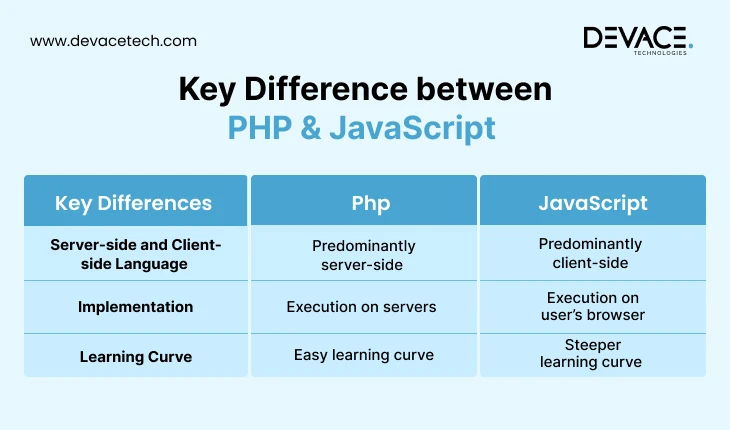
1. PHP vs Javascript: Server-side and Client-side Language
The PHP code runs on the server side not on the client’s browser, making it a server-side programming language. If a user requests a web page, PHP code is processed by the server, followed by interaction of databases, and then HTML content is generated, and sent to the client.
On the other hand, JavaScript is a client-side coding language. It means this language processes on the browser. When a web browser completes loading a web page, JavaScript improves the page’s interactivity. This enables users to submit forms, click buttons, and update content, without reloading the web pages.
2. PHP vs Javascript: Implementation
The execution of both scripting languages is different. PHP is executed on the server while JavaScript is executed in the user’s browser. The whole process works like this: when a client requests web pages, followed by the processing of PHP code on the server, after the processing of PHP script, ultimately in the form of a response to the browser.
While the execution process differs in the case of JavaScript. It is executed in the browser of the client. In this process, JavaScript code is processed by the browser, enabling the addition of animations or validation forms.
3. PHP vs Javascript: Learning Curve
PHP is quite popular as a beginner-friendly scripting language. This is due to its simple syntax and straightforward functions like managing forms, database queries, and sessions. That’s why the learning curve for PHP is normally gentle.
In contrast, JavaScript has a steeper learning curve especially for newbies. There are some difficulties you might face while working with JavaScript. These difficulties include:
- Asynchronous programming is difficult to handle for beginners.
- To ensure multiple browser combability of code.
- Advanced features like ES6 are often overwhelming for new programmers.
When to use PHP Vs JavaScript?
In the last point of our PHP vs JavaScript discussion, let’s understand when it is feasible to choose PHP and when JavaScript for your web applications.
When to opt for PHP
You can opt for PHP when you need to design the backend of web applications. Here we have some examples where PHP can be the best choice including:
- Development of websites
- Development of Content Management Systems (CMS)
- Create eCommerce platforms like e-stores for your products
- For server-side scripting
- To maintain legacy systems
- It’s a cost-effective option for web development projects
When to opt for JavaScript
Being a client-side scripting language, JavaScript is utilized to have dynamic web development experiences such as:
- To develop interactive frontend user interfaces like maps, sliders, or drag-and-drop interfaces
- Creating Single Page Applications (SPAs) like Facebook and Gmail
- Designing real-time web applications such as Slack or WhatsApp
- To form web APIs
- Handling client-side interactions
- To develop mobile apps
- For progressive web applications
You can also hire JavaScript developers for web development to avoid the complexity of the language.
Hire Skilled Web Developers With Devace Technologies
You can hire and get the services of skilled web developers with Devace Technologies. They are well aware of new tech industry trends and have expertise in the best web development practices. No matter, if you are working with PHP or JavaScript, our experts can develop dynamic web applications for you.
Conclusion
We can conclude this debate on this note that both PHP and JavaScript are essential scripting languages for web development. PHP is primarily good for the backend side of web applications; while JavaScript is well known for frontend web development. However, if both are used together, can smoothly create modern web applications.
Frequently Asked Questions
Is PHP better than JavaScript?
No, PHP is not better than JavaScript nor is JavaScript better than PHP. Both languages are different from each other. They serve distinct purposes, and the choice of selection depends on your web project needs. PHP is a server-side coding language mostly used for backend development. While JavaScript is a client-side scripting language, widely used for front-end web development.
Can I use both PHP and JavaScript in the same project?
Yes, for sure, it is quite common among web developers to use both PHP and JavaScript for the same web development project. These languages operate in different parts of web projects. As PHP runs at the server end it processes user requests, integrates with databases, and creates HTML content for the browser. In contrast, JavaScript runs at the client end. It can manipulate CSS and HTML, make requests, and update content on web pages.
In which type of projects is PHP better suited?
PHP is especially well-suited for multiple web projects including Content Management Systems (CMS) such as Joomla, Drupal, and WordPress, as well as eCommerce platforms like Magento, WooCommerce, and many more. It also powers the development of database-driven web applications, and server-side logic, and backs the maintenance of legacy applications.
In which type of projects is JavaScript better suited?
JavaScript is mostly effective for web projects including frontend web applications and creates features like form validation, sliders, and drop-down menus. It is also used for creating Single Page Web Applications (SPAs), real-time applications, and features such as live chats, multi-player games, and notifications. JavaScript is also responsible for mobile applications and asynchronous operations.
Can JavaScript replace PHP in the future?
Although JavaScript has improved significantly and now supports backend development due to the addition of Node.js. However, it is unlikely to replace PHP completely in the near future. Several reasons back this claim including the fact that Node.js can be used for full-stack development, but it does not provide the same features as that of PHP for backend development.
What can PHP do that JavaScript can’t?
There are certain areas where PHP excels and is well-suited for. These areas include the development of Content Management Systems (CMS) such as Drupal or Joomla, for handling server-side logic, and seamless integration with databases like MySQL. PHP is also compatible with legacy applications, and it is difficult to shift them completely to JavaScript.
